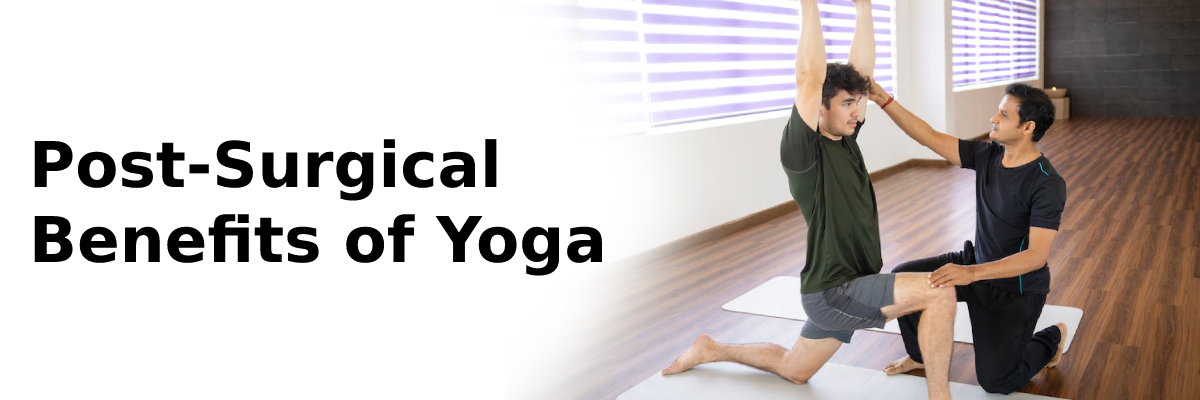
 IJCP Editorial Team
IJCP Editorial Team
Post-Surgical Benefits of Yoga
Yoga is a holistic practice accepted globally by the people and embraced by Indians for centuries. It involves a combination of physical postures, breathing techniques, and meditation, which can benefit both physical and mental health. A set of specific exercises, combined with breathing techniques and meditation principles, form the building blocks of yoga practice. Yoga is not confined to physical activity; it embraces healthy living strategies targeting dietary and lifestyle modifications. Yoga techniques have been proven to boost digestion, improve sleep, help tissue repair, and cope with depression and anxiety. While yoga is often associated with overall wellness and stress reduction, it can also be an effective tool for post-surgical recovery. Clinical results suggest that yoga interventions help reduce the length of hospital stay, improve wound healing and prevent post-operative complications.
Yoga helps reduce pain and inflammation after surgery.
One of the primary benefits of yoga for post-surgical recovery is its ability to reduce pain and inflammation. Yoga involves stretching and strengthening the muscles, which can help to alleviate soreness and stiffness in the body. The deep breathing techniques used in yoga can also help relax the mind and body, reducing discomfort and pain. Additionally, certain yoga poses can help improve circulation and blood flow, reducing inflammation and promoting healing.
Post-surgical yoga improves body flexibility and mobility.
Another essential benefit of yoga for post-surgical recovery is its ability to improve flexibility and range of motion. After surgery, it is common to experience stiffness and difficulty moving certain body parts. Yoga can help to gently stretch and strengthen the muscles, increasing flexibility and making it easier to perform everyday tasks. It can benefit those undergoing joint surgery or other procedures affecting mobility.
Yoga after surgery makes you feel better mentally and emotionally.
In addition to physical benefits, yoga can also have a positive impact on mental and emotional well-being. It can be conducive for those dealing with a significant amount of pain or discomfort as they recover. The relaxation techniques used in yoga, such as deep breathing and meditation, can help to reduce stress and anxiety, both of which are common after surgery. Yoga can also help to improve sleep quality, which is crucial for the body's ability to heal and repair itself.
Types of Post-Surgical Yoga Practices
It is important to remember that everyone's post-surgical recovery experience is different; therefore, formulating your yoga routine under the guidance and supervision of your healthcare professional and trained yoga expert is of great importance. Your healthcare provider may recommend appropriate yoga poses, breathing exercises, and lifestyle modifications, considering your specific needs and health limitations. Yoga should be carried out slowly and gradually. One should start yoga with mild exercises at a slow pace which can be increased gradually and later switched to intense workouts. This progressive approach to yogic practices helps your body to adjust to the situation and become more robust.
Among many yogic poses and exercises, choosing the right type of yoga is crucial. A few recommendations for yoga include the following:
1. Hatha yoga: This is a slower-paced form of yoga that involves holding poses for an extended period. It is a good option for those who are new to yoga or who are recovering from surgery.
2. Vinyasa yoga: This more dynamic form involves flowing from one pose to the next. It can be opted for by people looking for a more challenging practice.
3. Restorative yoga: This gentle form involves using props, such as blankets and blocks, to support the body in various poses. It can be beneficial for those recovering from surgery who may not have the strength or mobility to perform more advanced poses.
4. Chair yoga: This is a form of yoga performed while seated in a chair. It helps people with limited mobility or who cannot stand for extended durations.
Regardless of the type of yoga, it is essential to listen to your body and only perform poses and movements that feel comfortable and safe. If you experience any pain or discomfort, stop the pose immediately and consult with a healthcare provider. It is crucial to remember that everyone's recovery process is different, and it is essential to consult a healthcare professional before starting any new exercise program after surgery. It may also be necessary to modify certain poses or start with a gentler practice, such as restorative or yin yoga until you are fully healed.
The Bottom Line
To conclude, yoga can be a powerful tool for those who have recently undergone surgery, offering benefits such as improved flexibility and mobility, reduced pain and inflammation, and enhanced mental and emotional well-being. Working with a healthcare professional and modifying your practice as needed is crucial. Still, with careful consideration and attention to your body's needs, yoga can be a valuable addition to your post-surgical recovery journey.

IJCP Editorial Team
Comprising seasoned professionals and experts from the medical field, the IJCP editorial team is dedicated to delivering timely and accurate content and thriving to provide attention-grabbing information for the readers. What sets them apart are their diverse expertise, spanning academia, research, and clinical practice, and their dedication to upholding the highest standards of quality and integrity. With a wealth of experience and a commitment to excellence, the IJCP editorial team strives to provide valuable perspectives, the latest trends, and in-depth analyses across various medical domains, all in a way that keeps you interested and engaged.









.png)




Please login to comment on this article